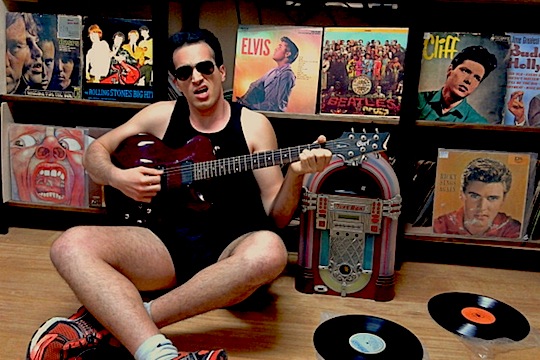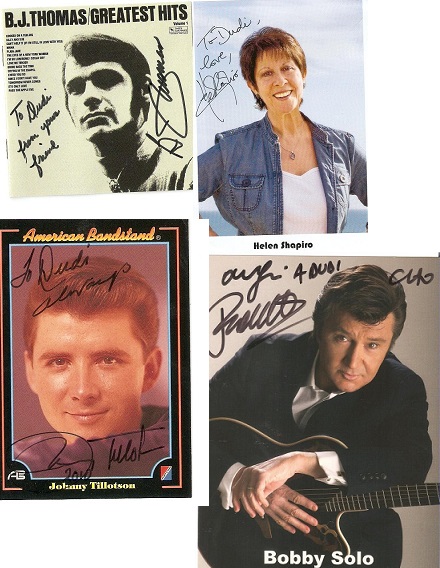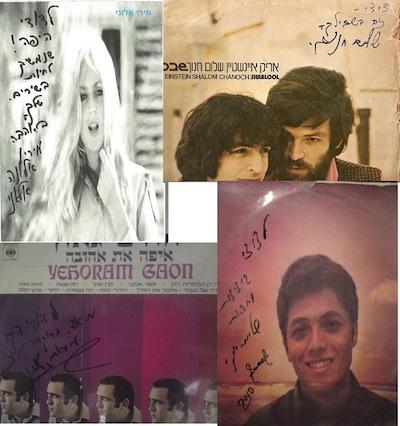At first glance, 26-year-old Dudi Petimer may seem like just another guy with a penchant for oldies and a throwback Elvis hairdo. Equipped with an 18,000-strong vinyl collection and endless knowledge of Israeli musical history, Petimer has taken responsibility for preserving the remnants of a culture that never quite made it into the mainstream.
By Khen Elmaleh
It’s difficult for me to remember the first time I encountered the name Dudi Petimer during my wanderings on YouTube. What is certain is that since then, I’ve seen the name many times, to the point that it has become an inseparable part of my search for nostalgic pieces of music. I actually remember the first version of his YouTube page, in which his name appeared as Dudi “Elvis” Petimer. The nickname, along with the songs he uploaded, left no room for doubt: we were talking about a middle-aged man, a romantic, who mainly deals with longing for the past, and who maybe even grows a small, nostalgic pompadour – one that recalls a time in which he jammed all the new rhythm and blues hits with his friends while dancing in the discotheques of Ramle to the sounds of the “rhythm bands.” Those were the days, when the bands brought the rhythm. A big surprise awaited me.
Although he dons a pompadour, and could easily pass for the imaginary fourth member of the Eskimo Limon crew (a famous Israeli film series from the 1970s), it turns out that Dudi Petimer is a young man who, surprisingly, decided to turn his love for the sounds of the past into an enterprise of cultural preservation. He owns an astonishing 18,000 records, including rarities and one-of-a-kinds, which he shares with the world on his YouTube channel (which is updated on a daily basis).
When we decided to hold an interview and put together a mix tape, we went over Petimer’s huge song collection in an attempt to find the rarest and most interesting tracks that he had collected over the years. Throughout that time, we began noticing that each of them had something in common – they all came from the margins. Aside from the music, we found a story of a society – one built from a diversity of cultures, places and sounds, struggling to find its identity. Through this search, our society is being tested, searching for its core to unite everyone around it, while at times rising up against the existing order – all in an attempt to define itself. This is the boiling point of our experimental melting pot – the point where we all meet. And in this meeting, there will be those who must fight for their place, for their voice to be heard. There will be those who will view the Other with suspicion, and there will be those who devote themselves to a process that demands creating something new out of the old ingredients.
We can clearly see these processes taking place through music. Through the list we’ve put together, you’ll be able to meet them all. This is our story, and the story of a young man who decided to preserve and remind us what we may have already forgotten.
So who is the man behind the huge music collection?
I’m 26 years old. I grew up in Tel Aviv’s Kfar Shalem neighborhood and today I live in Hatikva neighborhood. I’m a researcher of music, a songwriter, fitness instructor and soon-to-be sports therapist. I have over 18,000 old vinyl records, tens of thousands of albums and hundreds of cassette tapes — music is the air I breathe. I took it upon myself to preserve Hebrew music throughout the ages, since the authorities won’t do so. There are many singers and bands that have been forgotten over the years and did not receive their dues. I make sure to pay respect to every artist in every era in every genre, regardless of whether it is on vinyl, CD or whether I have to obtain an unreleased recording from the reels.
How did it all start?
I was an eight-year-old dreamer who loved oldies: Elvis, the Beatles, Ricky Nelson. I didn’t have a record player or a stereo system, and there was no YouTube so I would just record songs on my father’s tape recorder with a tape from music sites that played 30 seconds of each song. One day I was visiting my grandmother and my dad showed me the old record player that was no longer in use. He put on Elvis’s “King Creole” record from 1958; when I heard the sound my heart started to tremble like it never had before. Afterwards he took me to the flea market where I bought a Paul Anka record and a Platters record for one shekel. I played them over and over on my grandmother’s old record player which ended up in my dad’s studio.
When I was about 14, my dad bought me my own record player and took me to the “Hakhor Hashakhor” (The Black Hole) record store in Tel Aviv. It was like heaven. From that moment, I’ve gone to the record store once a month, and each time I can’t contain my excitement. The first Hebrew album I ever bought at The Black Hole was Yehoram Gaon’s “Eifo At Ahuva” (Where are you, my love). With the arrival of YouTube and its accessibility, I became more involved in music — I learned the biographies and discographies of hundreds of artists by heart, and I realized that there are artists whose music was not available on CD. You couldn’t even find them on Google. I decided to begin researching music, a project which has been going on for the past eight years. The project seeks to identify every singer who released a song in Hebrew from the 1920s until today. I gather information on them, whether it comes from stories, recording studios that they worked in, or artists and songwriters who worked with them.
What leads someone your age to deal with nostalgia?
I’ve been asked this question many times and I wish I had one answer to give. You see, I just feel a longing for a different time, as it is portrayed by the songs. Full of innocence, naiveté, true love. Without the pursuit of money, excessive violence or greed. Of course, in reality the story is a bit different – there were negative and difficult things in those times. But I always prefer to take the best of anything! I felt like this was my way of entering that world of “Eskimo Limon” where Elvis was the King, the men were romantic and knew how to treat a woman with respect, while the music that came out of the record players was pure sweetness. Sometimes I feel like I am part of that same generation; even though I live in today’s world I still have a positive attachment to nostalgia.
Why do you think it is difficult to find information on some of these artists? Do you see a resemblance between them? Is there a particular reasons that so many of them remain anonymous?
I don’t know why so many of them disappeared from the pages of history. Perhaps it’s because their style of music was seen as underground at the time. Singers like Meir Levi, Tzvia Abarbanel, Avazi Haber brought a musical style that the crowd, or more precisely the radio (the main media source at the time), had a difficult time swallowing. Maybe it was the lack of proper public relations and proper promotion. I have a huge collection of music magazines from the 60s, 70s and 80s where I found many “anonymous” singers who had many hits, but whom no one remembers or knows about today, not to mention their songs. As opposed to the radio, these magazines were innovative and dynamic, providing a platform for most genres. At the same time, most of these singers were derided as “disco and hafla” singers. While they were popular among the youth in the discotheques, the radio refused to play them. The “rhythm bands” of the 60s are a perfect example of groups that disappeared after one release, or singers who were dubbed “one-hit wonders” whom the entire neighborhood loved and listened to, yet the radio still refused to play.
Was Israeli or foreign rock ‘n’ roll played at home?
No rock ‘n’ roll was played at home! And barely any foreign music! I found out about Elvis and rock ‘n’ roll by myself from watching television. At home we listened to Eyal Golan, Sarit Hadad, Zehava Ben, Arik Einstein, Yehoram Gaon, Gesher HaYarkon, etc. Mostly Israeli music.
The rhythm bands, during the golden age of the clubs in Ramle and Lod, this is the most interesting musical and even social period for me. And yet, so little is known about it. There was an uprising. It was anti-establishment; young people who were tired of Eretz Israel songs and perhaps never felt like they were part of “Eretz Israel.” The guitars were a refuge. Most of the leading groups from back then are good friends of mine, I even wrote a song for The Churchills. These groups were definitely doing something that most of the “conservative” crowd was not used to.
Rock ‘n’ roll is thought of as subversive because it never mixed identities and wasn’t committed to anything. In rock ‘n’ roll everyone is equal and are not categorized into one sound or another because of their ethnic origin. At least this is how I believe it needs to be. The reality is that in Israel there were singers who, because of their belonging to a certain ethnic background, were categorized into a specific genre, regardless of whether they sang rock ‘n’ roll or Israeli songs. Take Aris San’s “Boom Pam,” isn’t that rock ‘n’ roll? The intro is taken from Ray Charles’s classic “What’d I Say” with a guitar solo from Umm Kulthum’s “Inta Omri” in the middle. Because of these aspects, the song isn’t considered rock ‘n’ roll, but rather “Mizrahi.” I am always astounded at the fact that these fantastic songs did not receive recognition, but rather were categorized before someone actually truly listened to the complexity of the sound and the lyrics.
You know, when I came across your YouTube page for the first time a few years ago, and I saw the name “Dudi ‘Elvis’ Petimer,” I was sure you were a former member of one of those rhythm bands…
You’re not the only one. A day doesn’t go by without someone telling me they thought I was 80. But then they see a young guy and even then they think I’m the grandson of Dudi Petimer.
At what point did you understand that YouTube was on your side? When did you decide to upload it all and share with the world?
I started around 2009, deciding only to share unknown artists or unknown songs of well-known artists. I’m not interested in sharing songs that everyone knows or classics. We have the radio, the media and music stores for that. I’m interested in rare or unreleased songs and recordings, or those that were never released on CD. My agenda is to research and preserve the culture of Israeli music that never received proper recognition – that never became part of the canon.
Thanks to YouTube, many people reach out to me every day in order to thank me for the music, memories, or the nostalgia, or in order to find recordings for them. Sometimes even the artists themselves ask me! My work never stops, and I am blessed to be part of this project, which apart from preserving forgotten Israeli culture, is also intended to bring happiness to all those who are thirsty for this music.
Have any artists reached out to you to help them find a specific song of theirs?
Of course! It happens almost every day. Artists, singers, composers and songwriters reach out to me to find songs that they do not have. Sometimes I reach out to them, and play them songs that they don’t even recall recording. It happens all the time. Some of them even ask me to send them photos and articles from my music-journalism archive. Some of them reach out asking me to conduct research into their work, and I do so with professionalism and pure love for their work. It happens quite often. Obviously the research isn’t easy. But do I have another choice?
Give me an example.
Tzvika Pik reached out to me to find a song of his in Italian from the Hasidic festival that he participated in. I did some research on Moshe Hillel and his group “Limonei HaDvash” along with Danny Meseng and Efi Weiss.
And what about personal stories? You must get a lot inquiries that have to do with people’s private memories.
I received an email yesterday from a man in Kiryat Gat whose brother fell into a coma. A few weeks ago he asked me if I have the songs that his brother loved in his youth. He was willing to pay me. Of course I found them and sent him the CD for free. He played the music for his brother and nothing happened. After a few days, the nurse calls him to say that his brother began humming a song, and it turned out to be one of the songs from the CD I made him! Today he is in recovery. The man sent me an email expressing his gratitude, in which he wrote that he now believes in the power of music and that both he and his brother will remember me for their entire lives. After receiving such heartwarming words it is beyond me to explain the meaning of music to each and every person.
For me, music has no borders – it has one purpose: to please the listeners! Music that accomplishes this goal carries meaning, even if only for one person or one memory. In the end, it has a cultural and sentimental worth. And that’s what is important. Music has a power that no human does and we must pay respect to it, and give it a platform without letting our beliefs, norms and influences suppress it. Music is a beautiful thing and makes the world a more beautiful place.
Listen to the best of Dudi Petimer’s classic collection:
More from Café Gibraltar:
Mixtape: Sounds from the ‘other’ Israel 1967-1978
Sex, drugs and the ‘Mizrahi sound’



